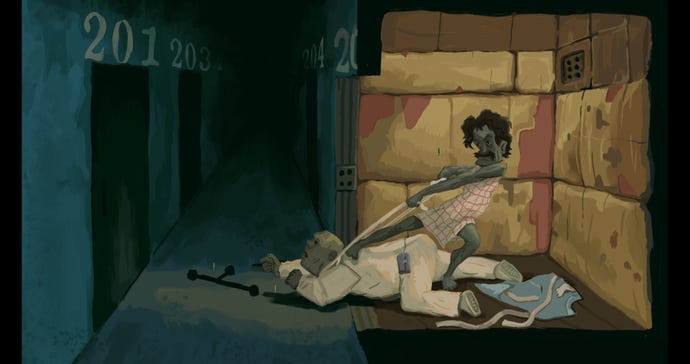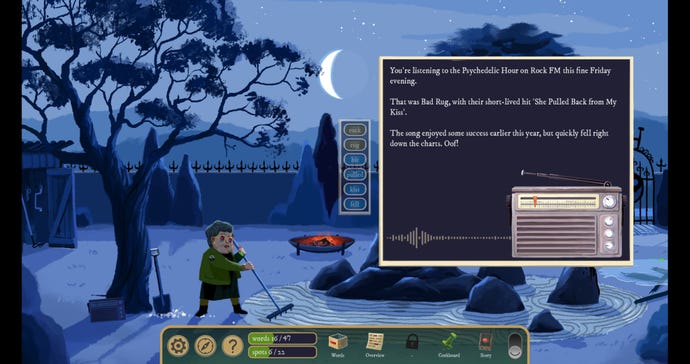
The rise of the golden idol review
Consistently building on a simple rule set with increasingly inventive twists, this detective puzzle game offers tough but fair head-scratchers that will make you feel like a genius when you solve them.
- Developer: Color gray games
- Publisher: Play pile
- Edition: November 12, 2024
- On: Windows, macOS
- By: Steam
- Price: £20/€20/$20
- Rated on: Intel Core i5-12600K, 32GB RAM, Nvidia RTX 2070, Windows 10
Here’s a Steam quote for you: ‘The rise of the golden idol is the best game I’ve ever played, where I spent most of my time staring at the screen and ‘well, that’s good chuffing’ it isThen?!” Devilish but honest, this detective puzzler requires a heady mix of observation, deduction and logic, but rewards you with an increasingly compelling story and increasingly infuriatingly brilliant puzzles. Despite teaching you everything you need to know in the tutorial, it still manages to introduce new wrinkles and twists to the formula with each new chapter. My verdict? Imagine me lying on the floor, massaging my temple with one hand and giving a big thumbs up with the other.
The first scene takes place in a squalid asylum, where we see a nurse desperately crawling for a bat while a patient strangles him with a belt. Later scenes will task us with answering the “why” and much more, but for now our job is to reveal the “who,” “what” and “where.” Certain objects and other points of interest are highlighted, and as you examine them a selection of related words are poured into our word box. Many of these words are useless. Some of them don’t. For example, the nurse’s name tag shows his name. “Ah” we think. “That will be useful for the ‘names’ objective.” We drag his name under his portrait and have the feeling that Dale Cooper is doing it.
 Image credit: Color gray Games/Rock Paper Shotgun.
Image credit: Color gray Games/Rock Paper Shotgun.
But what if we’re wrong, eh? We only really know that once we have completed it all the names. The game tells us if we got ‘two or less’ wrong, but otherwise it’s a big fat ‘wrong’ symbol, and back to the word box. But let’s say we know how name tags work, and we can sort them without any problem? Then we move on to ‘events’: ‘The ‘occupation’, ‘name nameson’, killed ‘moniker handle’ with an ‘object’ from an ‘other object’ in the ‘named location’. Drag the right words to the right places and, name is your relative, you’ve solved the case. These kinds of context hints (‘name’, ‘location’) aren’t on the actual sheet, but the game does provide you with some help, both through the syntax and through the color coding of certain word categories. For example, names are always red.
The most important thing the game had to achieve, as far as I see it, is to keep what is essentially multiple-choice detective work from becoming too easy for brute force. One way this is achieved is by simply having too many viable options. Once you get past the tutorial, you’ll be dealing with at least a half-dozen names, and many points of interest will yield additional words that are either not needed at all to solve the case, or end up being so contextually specific that you’re all but need to find out what happened to use them correctly. In addition to these red herring words, they are full of red herrings in the stories you have to solve, bastard subplots designed specifically to throw you off.
The reason these flub plots work so well to distract you is that, like everything in Golden Idol, they are all based on their own individual fragments of a larger story. Each scene describes not only the crime, conspiracy or other incident, but also the moments and sometimes days that preceded it. Early on, I noticed that I was dumbfounded because I had developed tunnel vision for only the points of interest. But what the game really wants you to do is take in the scene as a whole, including parts that aren’t necessarily highlighted. A piece of cloth. An open window. What individuals wear. You may not be able to inspect these things to add additional words to your collection, but they are still critical to finally putting all the pieces together.
Each scene tells its own story, of course, but I think it was around chapter three that I started solving individual scenes, not just for their own satisfaction, but because I became more and more invested in the larger mystery. The story jumps back and forth through time, at one point showing recurring characters at different points in their lives. It’s immensely satisfying to start making connections, not just based on what’s in front of you, but also based on the context you’ve previously picked up from the larger, unfolding mystery.
 Image credit: Color gray Games/Rock Paper Shotgun
Image credit: Color gray Games/Rock Paper Shotgun
And this is what really makes The Rise Of The Golden Idol special, I think: the way it squeezes so much character and flavor out of such a simple method of interactivity. You can go on a quest safe in the knowledge that you have all the tools to solve a scene, but still not feel limited or restricted. It’s a great example of a stripped-down design pitch in one area – “fill in the blanks” – allowing for incredible variety and creativity in other areas.
I do have a few complaints, but they’re really just user-friendly features that I would have liked to see. You’ll want to cross-reference a lot of information, so you’ll want to have multiple windows open at the same time. But I couldn’t find an option to resize it, resulting in a lot of screen clutter. At the end of each chapter you complete another timeline of events, but you’ll still need to review scenes you’ve already played to remind yourself of crucial information – more detailed summaries of these can be accessed via the scene selection menu. where you will be performing this would have been ideal.
That said, the main accessibility feature (at least as a reviewer who hadn’t played the previous game) was tailored to the way it needed to be. I used hints a lot ofand not once did they take away from the sense of fun or mystery, with even the biggest ones still giving me a lot to chew on. All things considered, I don’t really have anything profound or insightful to say about this. Rise Of The Golden Idol is a more satisfying, satisfying, sometimes dysfunctional mystery that’s polite enough to match every time it makes you feel like a complete idiot with another example of making you feel like a genius.
Leave a Reply